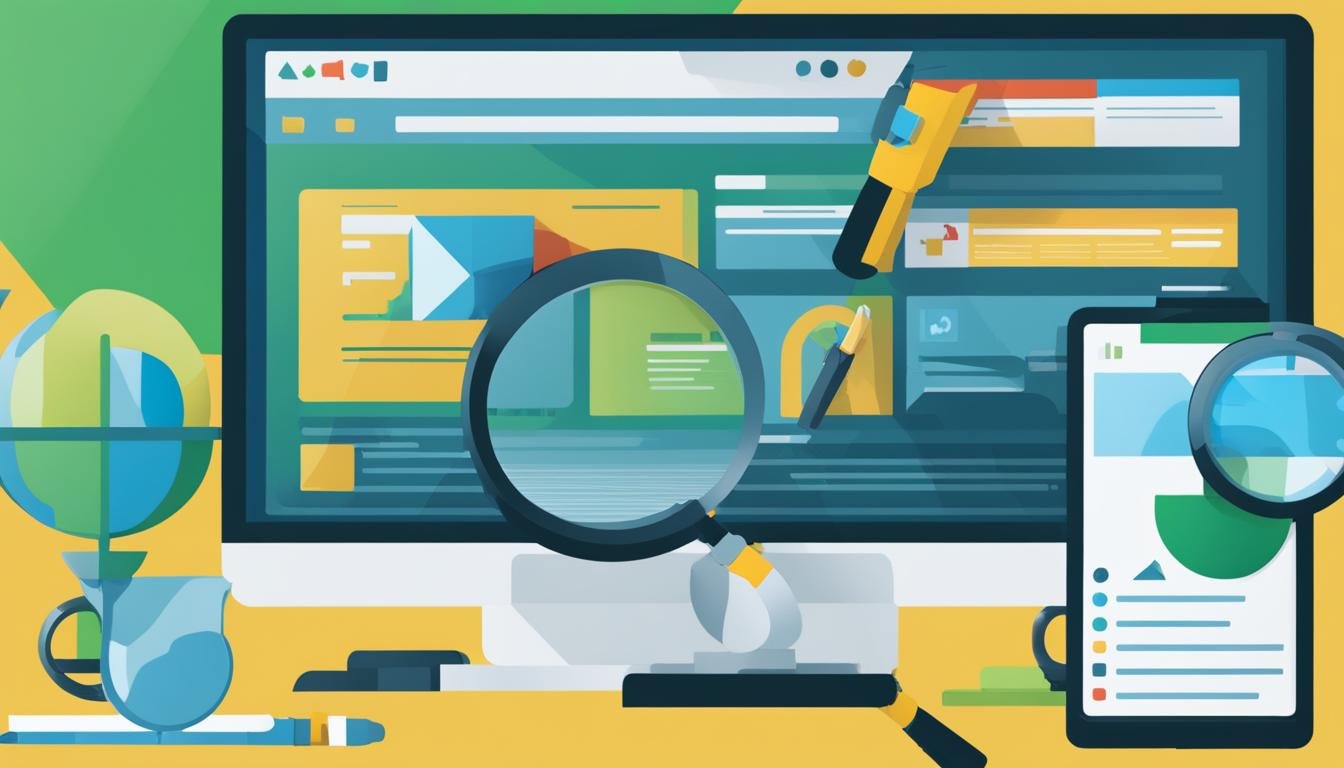In today’s digital age, having a website has become essential for businesses of all sizes and industries. A website allows you to reach a global audience, showcase your products or services, and establish credibility and trust with potential customers. It provides a 24/7 online presence, enables effective marketing and promotion, and offers valuable data collection and analysis. A website also gives you a competitive advantage in the marketplace and allows for adaptability and scalability as your business grows and evolves.
Key Takeaways:
- A website enables you to reach a global audience and showcase your products or services.
- Having a website enhances credibility and trust with potential customers.
- With a website, you have a 24/7 online presence and can engage in effective marketing and promotion.
- A website offers valuable data collection and analysis for informed decision-making.
- Having a website provides a competitive advantage and allows for adaptability and scalability.
Reaching a Worldwide Audience
Having a website is a powerful tool for businesses, as it allows them to reach a worldwide audience. With the internet connecting people from all corners of the globe, a website serves as a virtual storefront that is accessible to anyone with an internet connection. By establishing an online presence, businesses can tap into new markets and expand their reach beyond physical boundaries.
With a website, you can showcase your products or services to a global audience, providing them with valuable information and enticing visuals. Whether you are a local business looking to attract international customers or a global brand aiming to strengthen your presence in specific regions, a website enables you to tailor your content and marketing strategies to suit different target markets.
Furthermore, a website offers the opportunity to engage with potential customers in multiple languages, further enhancing your global appeal. By providing translations or localized content, you can bridge the language barrier and connect with a wider audience. This not only increases your chances of attracting international customers but also demonstrates your commitment to serving their needs.
By reaching a worldwide audience through your website, you can unlock new growth opportunities and expand your market presence on a global scale. Regardless of your industry or business size, having a website opens doors to a vast customer base that would otherwise be inaccessible.
Table: Global Reach Comparison
| Traditional Marketing | Website Presence |
|---|---|
| Local or regional reach | Global reach |
| Limited customer exposure | Unlimited customer reach |
| Higher costs for international marketing | Cost-effective international marketing |
| Geographical constraints | Overcome geographical constraints |
| Difficulty in expanding into new markets | Ability to tap into new markets easily |
“Having a website enables businesses to break free from geographical constraints and expand their customer base on a global scale.”
With a website, you can overcome the limitations of traditional marketing channels and take your business to new heights. The ability to reach a worldwide audience opens up a world of possibilities for growth, expansion, and increased brand visibility. Don’t miss out on the opportunity to connect with customers around the globe – invest in a website today!
Enhancing Credibility and Trust
A professionally designed website instantly enhances your business’s credibility and trustworthiness. It signals to potential customers that you are a legitimate and established business. A well-designed website is the digital equivalent of a clean and well-maintained physical store, making people more likely to trust your products or services. This credibility can lead to increased customer trust and loyalty.
When visitors land on a well-designed website, they are more likely to perceive your business as reputable and trustworthy. A visually appealing layout, intuitive navigation, and high-quality content all contribute to creating a positive impression. Additionally, websites with secure payment gateways and privacy policies further reinforce the sense of trustworthiness.
Having a website that showcases customer testimonials, positive reviews, and industry awards further strengthens your credibility. These social proofs demonstrate that your business has a track record of delivering excellent products or services. Potential customers are more likely to trust the opinions of others and feel confident in their decision to engage with your business.
A website also offers an opportunity to showcase your expertise and knowledge in your field. By providing valuable and informative content, such as blog posts or resources, you position yourself as a reliable source of information. This expertise builds trust and credibility among your target audience, establishing you as a thought leader in your industry.

Table: Benefits of Enhanced Credibility and Trust:
| Benefit | Description |
|---|---|
| Increased Conversion Rates | When customers trust your business, they are more likely to make a purchase or engage with your services. |
| Positive Word-of-Mouth | Customers who have a positive experience with your business are more likely to recommend it to others. |
| Competitive Advantage | Enhanced credibility sets you apart from competitors and makes customers more likely to choose your business. |
| Long-Term Customer Relationships | When customers trust your business, they are more likely to become loyal, repeat customers. |
By investing in a professionally designed website that enhances your credibility and trust, you position your business for long-term success in the digital marketplace. With increased customer trust and loyalty, you can enjoy improved conversion rates, positive word-of-mouth, and a competitive advantage that sets you apart from your competitors. Don’t underestimate the power of a trustworthy online presence in building a strong and reputable brand.
Expanding Your Reach
A website allows your business to reach a wider audience as it is accessible to anyone with an internet connection. This expanded reach opens up new opportunities for growth and market expansion that were previously unthinkable. With a website, you can tap into new markets, drive increased sales, and increase brand recognition. Having a website enables you to compete on a global scale and attract customers from various locations.
Increase Your Market Share
By having a website, you can expand your customer base beyond your local area and target a wider audience. This can lead to increased sales and business growth. With a website, you can reach customers who are searching for products or services like yours online, regardless of their location. This wider audience reach allows you to establish your brand in new markets and attract customers from different regions.
Target Niche Markets
A website also allows you to target niche markets that may have specific needs or preferences. With the right SEO strategies and content marketing, you can attract customers who are actively searching for niche products or services. For example, if you specialize in handmade crafts or organic skincare, a website can help you connect with customers who are specifically looking for those types of products. This targeted approach can lead to higher conversion rates and loyal customers.
Optimize Your Online Presence
Having a website gives you the opportunity to optimize your online presence and improve your visibility in search engine results. By implementing SEO techniques such as keyword optimization, link building, and creating high-quality content, you can increase your website’s ranking in search engine results pages. This means that more people will find your website when searching for products or services related to your business, resulting in a wider audience reach and increased traffic to your site.
| Benefits of Website Reach | Explanation |
|---|---|
| Expanded customer base | A website allows you to reach customers beyond your local area and target a wider audience, leading to increased sales and business growth. |
| Target niche markets | A website provides the opportunity to connect with customers who have specific needs or preferences, helping you establish your brand in niche markets and attract loyal customers. |
| Optimized online presence | By implementing SEO techniques, you can improve your website’s visibility in search engine results, driving more traffic and expanding your reach. |
24/7 Availability
In today’s fast-paced world, convenience and accessibility are paramount. With a website, your business is open 24/7, ensuring that potential customers can access your products or services at any time. Whether it’s in the middle of the night or during a busy workday, your website is there to engage and assist customers, providing them with the information they need when they need it.
This round-the-clock availability also gives you a competitive edge in the market. While your competitors may have set operating hours, your website remains accessible, allowing you to capture potential customers who are searching for products or services outside of regular business hours. By being available when others are not, you can attract and convert customers who value convenience and instant access.
Furthermore, a 24/7 online presence demonstrates your commitment to customer satisfaction. It shows that you prioritize responsiveness and convenience, catering to the needs of your target audience. This accessibility builds trust and confidence in your brand, as customers know that you are available to address their inquiries, support their purchasing decisions, and provide assistance whenever they require it.

Meeting Customers’ Needs Anytime, Anywhere
By embracing 24/7 availability, you can meet the needs of customers across different time zones and locations. Your website eliminates the limitations of physical distance and time constraints, allowing you to reach a broader audience and expand your customer base. This increased accessibility gives you the opportunity to connect with potential customers who might otherwise be out of reach.
Building Trust and Loyalty
When customers know they can rely on your website to access information or make purchases at their convenience, it fosters trust and loyalty. By providing a 24/7 online platform, you demonstrate your commitment to customer satisfaction and showcase your willingness to go the extra mile. This trust and loyalty can result in repeat business and positive word-of-mouth referrals, ultimately contributing to the growth and success of your business.
Table: Comparing Operating Hours vs. 24/7 Availability
| Operating Hours | 24/7 Availability |
|---|---|
| Limited accessibility | Unrestricted access |
| Missed opportunities during off-hours | Continuous engagement with potential customers |
| May require additional staffing for extended hours | Automated processes for efficient customer support |
| Time zone limitations | Global reach and customer support |
As shown in the table above, operating within set hours limits your accessibility and may result in missed opportunities. On the other hand, having a website with 24/7 availability offers unrestricted access, continuous engagement, automated processes, and global reach. By embracing 24/7 availability, you can provide exceptional customer service and stay ahead of the competition.
Effective Marketing and Promotion
In today’s competitive business landscape, effective marketing and promotion are crucial for success. With a professionally designed website, you have a powerful tool at your disposal to reach and engage with your target audience. A well-executed online marketing strategy can drive traffic to your website, generate leads, and ultimately increase sales. Let’s explore some key strategies and tactics that can help you harness the full potential of your website for marketing and promotion.
1. Search Engine Optimization (SEO): Implementing SEO best practices can significantly improve your website’s visibility in search engine results. By optimizing your website’s content, structure, and meta tags, you can improve its ranking, making it easier for potential customers to find you. Conduct keyword research to identify the most relevant and high-volume keywords in your industry, and incorporate them strategically into your website’s content.
2. Content Marketing: Creating valuable and engaging content is essential for attracting and retaining a loyal audience. Develop a content strategy that aligns with your target audience’s interests and needs. This can include blog posts, articles, videos, infographics, and more. By consistently producing high-quality content, you can position yourself as an industry thought leader and build trust with your audience.
3. Social Media Marketing: Leverage the power of social media platforms to amplify your brand’s reach and engage with your target audience. Identify the social media platforms that are most relevant to your business and create a consistent presence on those platforms. Use compelling visuals, shareable content, and interactive features to encourage user engagement and increase brand awareness.
4. Email Marketing: Building an email list allows you to directly communicate with your audience and nurture relationships over time. Implement email marketing campaigns to share valuable content, promotions, and updates with your subscribers. Personalize your emails to make them more engaging and relevant, and use analytics to measure the effectiveness of your campaigns.
5. Influencer Marketing: Collaborating with influencers in your industry can help expand your reach and gain credibility with your target audience. Identify influencers who align with your brand values and have a significant following. Partner with them to create co-branded content, sponsorships, or endorsements that can introduce your brand to a wider audience.
Table: Key Marketing Metrics to Track
| Metric | Description |
|---|---|
| Website Traffic | The total number of visitors to your website. Track both overall traffic and traffic from specific sources. |
| Conversion Rate | The percentage of website visitors who take a desired action, such as making a purchase or filling out a contact form. |
| Click-Through Rate (CTR) | The percentage of people who click on a specific link or ad compared to the total number of people who see it. |
| Engagement Rate | The level of interaction and engagement your audience has with your content, such as likes, comments, and shares on social media. |
| Return on Investment (ROI) | The measure of profitability resulting from your marketing efforts. Calculate the revenue generated compared to the cost of marketing. |
Incorporating these marketing strategies and tracking the right metrics will help you optimize your website’s performance and achieve your marketing goals. Remember to regularly analyze your data, adapt your strategies based on the insights gained, and continuously refine your marketing efforts to stay ahead of the competition.
Cost-Effective Solution
When it comes to marketing your business, cost is always a factor to consider. That’s why having a website is a cost-effective solution that can provide you with great returns on your investment. Unlike traditional marketing channels like print media or television advertising, a website allows you to reach a wider audience at a fraction of the cost. With a well-designed website, you can showcase your products or services, engage with potential customers, and drive sales without breaking the bank.
By investing in a website, you eliminate the need for expensive print materials and physical advertisements. You can easily update and modify your website as needed, without incurring additional costs. This flexibility and adaptability make a website a smart choice for businesses with limited budgets, as it allows you to compete with larger companies on a global scale without the hefty expenses.
In addition, a website provides a level playing field for businesses of all sizes. Whether you’re a small startup or an established corporation, your website can help you stand out and attract customers from all over the world. It allows you to showcase your unique value proposition and establish your brand presence online, without the need for a physical storefront or expensive advertising campaigns.
| Advantages of a Cost-Effective Website | |
|---|---|
| 1. Lower marketing costs | |
| 2. Elimination of print materials and physical advertisements | |
| 3. Flexibility and adaptability for updates and modifications | |
| 4. Level playing field for businesses of all sizes |

With a cost-effective website, you can increase your brand visibility, reach a wider audience, and generate more leads and sales. The online marketplace has become highly competitive, and a website is the key to staying ahead of the game. By investing in a website that fits your budget, you can leverage the power of the internet to grow your business and achieve your goals.
Maximizing Your Website’s Cost-Effectiveness
To ensure that your website remains a cost-effective solution, it’s important to make the most of its capabilities. Here are a few tips:
- Optimize your website for search engines to attract organic traffic and reduce the need for paid advertising.
- Create valuable and engaging content that keeps visitors coming back and drives conversions.
- Utilize social media platforms to promote your website and reach a wider audience.
- Regularly analyze the performance of your website and make data-driven decisions to improve its effectiveness.
By implementing these strategies, you can maximize the cost-effectiveness of your website and ensure that it continues to generate results for your business.
Improved Customer Support
Providing exceptional customer support is crucial for the success of any business. With a website, you can enhance your customer support capabilities and ensure that your customers receive the assistance they need in a timely and efficient manner.
One way to improve customer support on your website is by creating a dedicated FAQ section. This allows you to address common customer questions and provide clear and concise answers. By proactively providing solutions to common issues, you can save time for both your customers and your support team.
Another effective way to enhance customer support on your website is by incorporating live chat support. This feature enables customers to interact with your support team in real-time, getting immediate responses to their queries. Live chat support not only boosts customer satisfaction but also increases the chances of converting potential customers into paying ones.
Furthermore, you can provide user guides and troubleshooting tips on your website to assist customers in resolving common issues independently. By empowering your customers with self-service resources, you can reduce the strain on your support team and improve overall customer satisfaction.
Investing in improved customer support on your website plays a crucial role in building strong customer relationships and fostering loyalty. By ensuring that your customers receive the assistance they need, you can enhance their experience and differentiate yourself from competitors.
| Benefits of Improved Customer Support |
|---|
| 1. Increased customer satisfaction |
| 2. Higher conversion rates |
| 3. Greater customer loyalty |
| 4. Reduced strain on support team |
| 5. Improved overall customer experience |
Table: Benefits of Improved Customer Support
“Investing in improved customer support is not only about resolving issues but also about building strong relationships and fostering loyalty.”
Data Collection and Analysis
A website offers valuable insights into customer behavior and preferences. By collecting and analyzing data, businesses can make informed decisions to drive growth and success. Here are some key benefits of data collection and analysis:
1. Customer Insights
Data collection allows businesses to gather information about their customers, such as demographics, browsing habits, and purchase history. This data provides valuable insights into customer preferences and behavior, allowing businesses to tailor their products, services, and marketing strategies accordingly. By understanding their target audience better, businesses can deliver personalized experiences and build stronger customer relationships.

2. Performance Evaluation
Data analysis enables businesses to measure the effectiveness of their marketing campaigns, website performance, and overall business strategies. By tracking key metrics such as website traffic, conversion rates, and customer engagement, businesses can identify areas of improvement and make data-driven decisions. This iterative approach to performance evaluation helps businesses optimize their operations and achieve better results.
3. Predictive Analytics
With the help of data analysis, businesses can leverage predictive analytics to forecast future trends and outcomes. By analyzing historical data and identifying patterns, businesses can make predictions about customer behavior, market trends, and industry developments. This enables businesses to proactively adapt their strategies, anticipate customer needs, and stay ahead of the competition.
| Benefits of Data Collection and Analysis | |
|---|---|
| Customer Insights | Gather information about customer preferences and behavior |
| Performance Evaluation | Measure marketing campaigns, website performance, and business strategies |
| Predictive Analytics | Forecast future trends and outcomes based on data analysis |
Data collection and analysis are essential for businesses looking to make data-driven decisions, optimize performance, and stay ahead in a competitive marketplace. By harnessing the power of data, businesses can gain valuable insights, improve customer experiences, and achieve sustainable growth.
Showcasing Your Portfolio
As a designer, artist, or photographer, your portfolio is a testament to your skills and artistic style. A website provides the perfect platform to showcase your portfolio in a visually appealing and organized manner. By creating a dedicated section on your website, potential clients can easily browse through your work, get a sense of your artistic capabilities, and determine if your style aligns with their needs.
With a website, you have complete control over how you present your portfolio. You can include high-resolution images, detailed descriptions, and even categorize your work based on different themes or mediums. This level of customization and attention to detail helps you create a captivating visual experience for potential clients, leaving a lasting impression.
Table: Examples of Portfolio Sections
| Portfolio Section | Description |
|---|---|
| Graphic Design | Showcase your expertise in creating visually stunning graphics for branding, marketing materials, and more. |
| Illustration | Display your illustrative skills by highlighting your ability to create captivating and unique artwork. |
| Photography | Feature your best photographs, organized by genre or theme, to demonstrate your talent behind the lens. |
| Web Design | Show examples of websites you’ve designed, highlighting your ability to create user-friendly and visually appealing online experiences. |
Your website’s portfolio section acts as a virtual gallery, allowing potential clients to explore your work at their own pace and from any location. This accessibility is especially valuable for attracting clients who may not have the opportunity to visit a physical gallery or studio.
By showcasing your portfolio on your website, you establish yourself as a credible and talented professional in your industry. Your portfolio becomes a powerful tool in attracting new clients, securing projects, and ultimately growing your creative career.

Adaptability and Scalability
When it comes to running a business, adaptability and scalability are crucial for long-term success. A modern website offers the flexibility and growth potential that businesses need to thrive in a dynamic marketplace. Whether you’re a small startup or an established enterprise, having a website that can adapt to changing trends and scale with your growth is essential.
One of the key advantages of a website is its adaptability. As your business evolves and new opportunities arise, you can easily update and expand your website to reflect these changes. Whether you want to add new product lines, target a different audience, or incorporate new technologies, your website can accommodate these modifications with relative ease.
Scalability is another important aspect of a website. As your business grows, your website should be able to handle the increased traffic and demand. A well-designed website can handle high volumes of visitors and transactions without compromising performance or user experience. This scalability ensures that your website remains responsive and reliable, even during periods of rapid growth.
In summary, adaptability and scalability are crucial benefits of having a website for your business. With a website that can adapt to changing market conditions and scale with your growth, you can stay ahead of the competition and meet the evolving needs of your customers. Investing in a modern, flexible website is an investment in the future success and longevity of your business.
| Benefits of Adaptability and Scalability | Examples |
|---|---|
| 1. Flexibility to update and expand | Adding new product lines Targeting a different audience Incorporating new technologies |
| 2. Ability to handle increased traffic and demand | Scaling website performance Managing high volumes of visitors and transactions |
| 3. Staying ahead of the competition | Adapting to changing market conditions Meeting evolving customer needs |
Conclusion
Having a website is no longer a luxury but a necessity in today’s digital age. It allows businesses to expand their reach and connect with a global audience. A website enhances credibility and trust, making it easier to attract and retain customers. With 24/7 availability, potential customers can access information and make purchases at their convenience. A website also serves as a cost-effective marketing and promotion tool, offering valuable data collection and analysis.
By showcasing your portfolio and adapting to business changes, a website helps you stay competitive in the market. It provides a platform for improved customer support and empowers customers to find solutions on their own. Investing in a website opens up new opportunities, increases brand recognition, and drives business growth. Don’t miss out on the potential that a website can bring to your business. Take the leap and unleash its power today!
FAQ
Why is having a website important for businesses?
Having a website is essential for businesses in today’s digital age because it allows them to reach a global audience, showcase their products or services, and establish credibility and trust with potential customers.
How does a website help in reaching a worldwide audience?
A website allows businesses to expand their reach beyond physical boundaries and connect with potential customers from all corners of the globe. It makes the business visible to people worldwide, opening up new opportunities for growth and market expansion.
How does a website enhance credibility and trust?
A professionally designed website instantly enhances a business’s credibility and trustworthiness. It signals to potential customers that the business is legitimate and established.
How does a website help in expanding the reach of a business?
A website is accessible to anyone with an internet connection, allowing businesses to reach a wider audience. It opens up new opportunities for growth and market expansion, enabling businesses to tap into new markets, drive increased sales, and increase brand recognition.
Why is 24/7 availability important for businesses?
Unlike physical stores with set operating hours, a website is open 24/7, 365 days a year. This means that potential customers can access information about products or services, make inquiries, or even complete purchases at any time that suits them.
How does a website contribute to effective marketing and promotion?
A website serves as an excellent platform for marketing and promoting a business. It allows businesses to showcase their products or services, highlight customer testimonials, and create engaging content that drives interest. With the right SEO strategies, a website can rank higher in search engine results, making it easier for potential customers to find the business.
Why is a website a cost-effective solution for marketing?
Compared to traditional marketing channels like print media or television advertising, a website offers a cost-effective means of reaching and engaging with a target audience. It provides a level playing field for businesses of all sizes, allowing smaller enterprises to compete with larger ones on a global scale without breaking the bank.
How does a website contribute to improved customer support?
A website can serve as a valuable resource for customer support. Businesses can provide FAQs, user guides, troubleshooting tips, and even live chat support to assist customers. By addressing common customer queries proactively, businesses can improve the overall customer experience and reduce the strain on their customer support team.
How does a website help in data collection and analysis?
A website offers valuable insights into customer behavior and preferences. Businesses can collect data on website traffic, user engagement, conversion rates, and more. This data can help businesses refine their marketing strategies, tailor their offerings, and improve the overall customer experience.
How does a website help in showcasing a portfolio?
For businesses that rely on visual appeal, such as designers, artists, or photographers, a website serves as an excellent platform to showcase their portfolio. They can display their work in a visually pleasing and organized manner, making it easy for potential clients to assess their skills and style.
How does a website provide adaptability and scalability?
A modern website is highly adaptable and scalable. As a business grows and evolves, they can easily update and expand their website to reflect these changes. Whether they want to add new products, expand their service offerings, or launch a blog, their website can accommodate these changes without the need for a complete overhaul.
Why is having a website essential for businesses?
Having a website is essential for businesses in today’s competitive marketplace as it offers numerous benefits such as reaching a global audience, enhancing credibility and trust, providing 24/7 accessibility, enabling effective marketing and promotion, offering a cost-effective solution, improving customer support, collecting valuable data, showcasing portfolios, and providing adaptability and scalability.
Source Links
- https://www.linkedin.com/pulse/unleash-your-businesss-potential-go-global-without-website?trk=organization_guest_main-feed-card_feed-article-content
- https://www.iplocation.net/building-a-powerful-online-presence-unleash-your-business-potential-with-professional-web-design
- https://medium.com/@seodevexhub80/unleash-your-business-potential-the-top-benefits-of-a-modern-professional-website-5fc42793a39f










